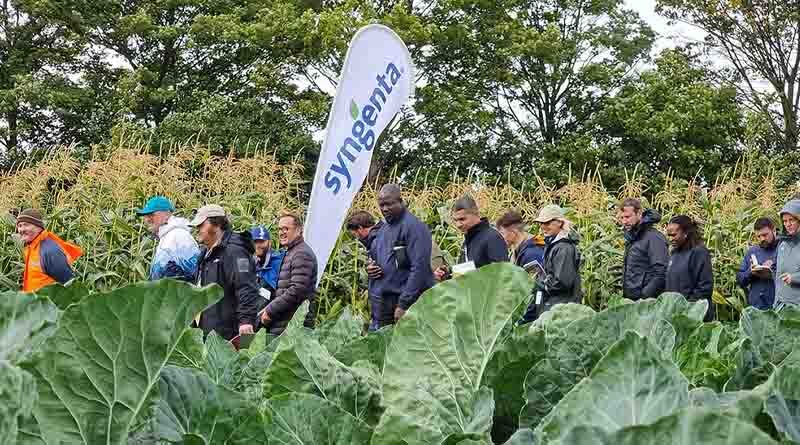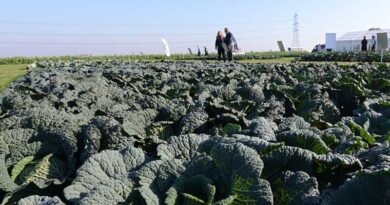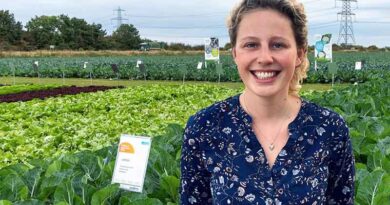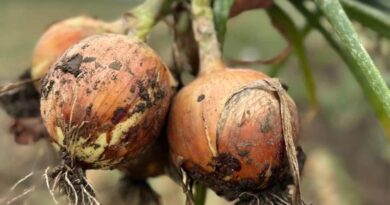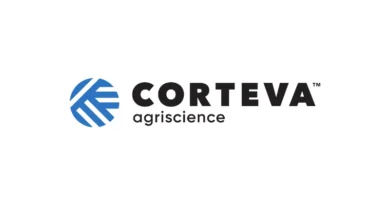Record-breaking attendance at Syngenta Fields of Innovation
07 October 2022, Netherlands: Syngenta Vegetable Seeds welcomed more than 1700 guests to the company’s annual Fields of Innovation open days in Grootebroek, Netherlands, from 27 – 29 September.
Fields of Innovation featured more than 550 varieties of 25 unique crops on the four-hectare site. Growers and guests from around the world discovered, tasted, and discussed new varieties with a team of experts in the field.
Visitors joined experts to discover the newest vegetable varieties from the R&D pipeline and experience the Plant Pathology Lab detailing the 12 to 20 years of research, trials and development by breeders and researchers to bring new varieties to grower fields.
For the first time, the event included a TechZone, featuring some cutting-edge technologies enabling farmers to be more productive, profitable and sustainable. Syngenta experts showcased Interra® Scan, the Biodiversity Sensor and the EDAPHOLOG soil insect sensor.
Arend Schot, Syngenta Vegetable Seeds Head Europe, Africa, and Middle East, said: “This year we set an attendee record with people eager to learn more about our key varieties and other Syngenta innovations.
“This has become a major meeting point for growers and their customers, distributors and our own breeders, and our product development and commercial teams,” he reported.
“Our tireless commitment to finding solutions for growers will never change. The technologies we showcased at Fields of Innovation are proof that we want to work hand-in-hand with growers to solve the challenges they face every season so we can become their true partner in their challenging work to feed the world.”
Blockbuster and up-and-coming varieties
The four-hectare Fields of Innovation featured more than 550 varieties in 25 unique crops. Some of the highlights included:
- Ready-to-grow batavia: Combining an attractive green, fresh colour with nice plant structure and very good upside- and downside-presentation, the new batavia assortment is something to consider. It features good vigour, bolting and tipburn tolerance, and high resistance to leaf and soil fungus. Syngenta is passionate about providing growers many choices in leaf color, speed of growth and ecology to cover all regions and demand.
- Weatherproof cabbage: With the ever-growing threat of climate change, growers are looking for cabbage varieties that withstand adversity such as too much, or too little rain. Syngenta showcased its Super Team lineup of cabbage that features tolerance to weather stresses and to pests such as thrips and Xanthomonas.
- Future-ready green bean: Whether it’s sieve size or resistance to disease, Syngenta breeders work closely with growers to understand their needs. With two distinct markets, fresh and processing, green bean growers need varieties suited to the demands of consumers and processors—and Syngenta is ready.
- Award-winning iStem: For trend-setting growers, iStem is the delicious, innovative new cauliflower and is ready to plant. It grows nearly identical to traditional cauliflower, providing an easy transition for growers considering this new opportunity.
- Downy mildew-resistant onion: Syngenta is excited to showcase its first downy mildew-resistant onion for European growers. The variety, Prediction, is traditionally-bred and gives growers ease-of-mind and potentially higher yields.
- One-of-a-Kind pointed savoy cabbage: With a distinct point and outstanding savoy leaves, growers had the opportunity to see something truly unique. It features the resistances and strengths found in traditional Syngenta savoy cabbage, with an eye-catching point.
- Spinach for any grower: Syngenta agronomists shared a wide assortment of spinach varieties that meet processing and fresh market demands. Syngenta’s varieties combine field performance – such as nice and very diverse leaf shapes, colors, erect plants, thick leaves and good yield potential – with high disease resistance such as Stemphylium and Peronospora.
- Disease-resistant squash: With decades of experience in squash breeding, Syngenta offers a full lineup of healthy squash with high yield potential. Varieties include both short- and long-cycle to meet market need, along with disease resistance or tolerance to common diseases in squash. In addition to disease resistance, growers saw squash varieties that displayed uniformity, good colour, and other traits important to the fresh market.
- White and bicolored sweet corn: New to the European market, white and bicolored sweet corn varieties feature super sweet kernels perfect right off the cob at a backyard barbeque. Syngenta experts showcased these new introductions and how they perform in various conditions around the world. White and bicolored varieties grow similar to yellow fresh market sweetcorn that’s more common in Europe.
The Plant Pathology Experience
Syngenta welcomed breeders and researchers to the field to showcase the Plant Pathology Experience. Here they explained the many steps they take to ensure success when introducing resistant varieties. For example, in brassica crops it takes 12 to 20 years of research, trials, and development to bring new varieties to grower fields.
“Breeding for resistance is both science and an art,” said Jan Bruin, Syngenta Trait Development Lead, Brassicas. “The science is obvious in every step, we’re combining alleles, working with plant biology, and understanding the genetics—to name a small part of the ‘science.’
“The art is taking all of that information and using in a way that creates value. Finding those combinations often takes creativity and a close understanding of our customers and the end consumers.”
Technology and having the right experts has accelerated the breeding process and enabled a greater degree of success, advised Bruin. By using molecular marker technology breeders can introgress resistances in their varieties faster. This allows more crop cycles per year, which means new breeding advancements, quicker.
This also means breeders can cross desirable traits into modern varieties with greater speed than older methods. For example, if a breeder wants to introgress a trait for resistance to Fusarium, it takes four to five years, instead of around seven or eight years.
“We work hard every day to find solutions like new resistance traits for growers,” Bruin added. “It was exciting to get to talk to growers and show them some of the work behind the resistant varieties they grow.”
A Look into the TechZone
For the first time, the event included a new TechZone, featuring cutting-edge technologies that help growers be more productive, profitable, and sustainable. Syngenta experts introduced Interra® Scan, the Biodiversity Sensor, and the EDAPHOLOG soil insect sensor.
Interra® Scan was launched during Fields of Innovation and is Syngenta’s first soil health service that brings new technology to deliver high-resolution soil nutrient, texture, and carbon maps with up to 27 layers of information for growers to accurately determine soil conditioning and nutrient support.
“Interra® Scan produces high-resolution maps accessible by growers’ computers via the Interra® Scan platform,” explained Mark Hall, Head of Sustainable and Responsible Business EAME.
“The detection technology provides mapping of all common nutrient properties including, pH, soil texture, organic matter, carbon, and cation exchange capacity, as well as elevation and plant water availability – all together, it offers over 800 data reference points per hectare. It is the equivalent of a complete medical check-up for humans, but for soil.”
The Biodiversity Sensor was first launched at the world Biodiversity Forum, and features 24/7 biodiversity monitoring that automatically, autonomously, and reliably identifies most species. This data can help showcase what’s present in the field today and what that means for biodiversity overall.
The TechZone also featured the EDAPHOLOG soil insect sensor that helps demonstrate fields’ soil health and overall diversity of ecosystems.
Also Read: India signs deal with Dubai company to improve DAP and NPK supply
(For Latest Agriculture News & Updates, follow Krishak Jagat on Google News)

